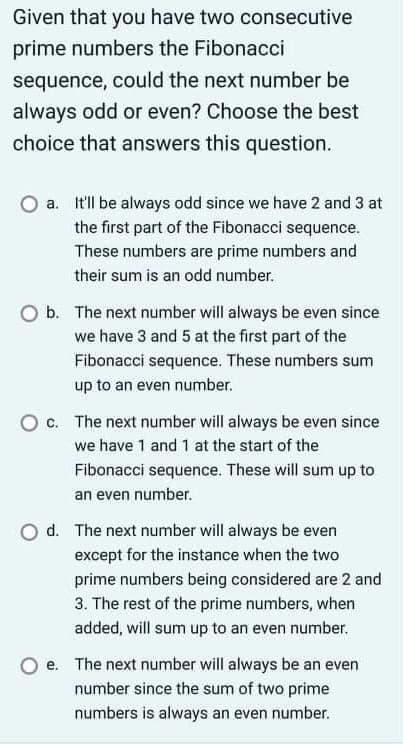ne numbers the Fibonacci quence, could the next number be ays odd or even? Choose the best ino thot noworg thio quootion
ne numbers the Fibonacci quence, could the next number be ays odd or even? Choose the best ino thot noworg thio quootion
Algebra for College Students
10th Edition
ISBN:9781285195780
Author:Jerome E. Kaufmann, Karen L. Schwitters
Publisher:Jerome E. Kaufmann, Karen L. Schwitters
Chapter14: Sequences And Mathematical Induction
Section14.1: Arithmetic Sequences
Problem 77PS
Related questions
Question

Transcribed Image Text:Given that you have two consecutive
prime numbers the Fibonacci
sequence, could the next number be
always odd or even? Choose the best
choice that answers this question.
a. It'l be always odd since we have 2 and 3 at
the first part of the Fibonacci sequence.
These numbers are prime numbers and
their sum is an odd number.
O b. The next number will always be even since
we have 3 and 5 at the first part of the
Fibonacci sequence. These numbers sum
up to an even number.
c. The next number will always be even since
we have 1 and 1 at the start of the
Fibonacci sequence. These will sum up to
an even number.
d. The next number will always be even
except for the instance when the two
prime numbers being considered are 2 and
3. The rest of the prime numbers, when
added, will sum up to an even number.
e. The next number will always be an even
number since the sum of two prime
numbers is always an even number.
Expert Solution
This question has been solved!
Explore an expertly crafted, step-by-step solution for a thorough understanding of key concepts.
Step by step
Solved in 2 steps with 2 images

Recommended textbooks for you

Algebra for College Students
Algebra
ISBN:
9781285195780
Author:
Jerome E. Kaufmann, Karen L. Schwitters
Publisher:
Cengage Learning



Algebra for College Students
Algebra
ISBN:
9781285195780
Author:
Jerome E. Kaufmann, Karen L. Schwitters
Publisher:
Cengage Learning



Glencoe Algebra 1, Student Edition, 9780079039897…
Algebra
ISBN:
9780079039897
Author:
Carter
Publisher:
McGraw Hill

College Algebra (MindTap Course List)
Algebra
ISBN:
9781305652231
Author:
R. David Gustafson, Jeff Hughes
Publisher:
Cengage Learning
